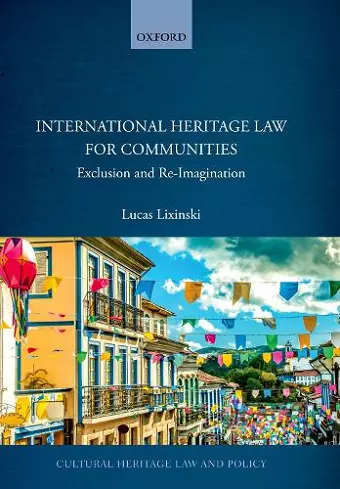International Heritage Law for Communities
Exclusion and Re-Imagination
Format:Hardback
Publisher:Oxford University Press
Published:6th Jun '19
Currently unavailable, and unfortunately no date known when it will be back

This book critically engages the shortcomings of the field of international heritage law, seen through the lenses of the five major UNESCO treaties for the safeguarding of different types of heritage. It argues that these five treaties have effectively prevented local communities, who bear the brunt of the costs associated with international heritage protection, from having a say in how their heritage is managed. The exclusion of local communities often alienates them not only from international decision-making processes but also from their cultural heritage itself, ultimately meaning that systems put in place for the protection of cultural heritage contribute to its disappearance in the long term. International Heritage Law for Communities adds to existing literature by looking at these UNESCO treaties not as isolated regimes, but rather as belonging to a discursive continuum on cultural heritage. In doing so, the book focuses on themes that cut across the relevant UNESCO regimes like the use of expert rule in international heritage law, economics, the relationship between heritage and the environment, among others, rather than the regimes themselves. It uses this mechanism to highlight the blind spots and unintended consequences of UNESCO treaties and how choices made in their drafting have continuing and potentially negative impacts on how we think about and safeguard heritage.
...a much--needed critical examination * Bruno Pegorari, American Society of International Law *
In International Heritage Law for Communities: Exclusion and Re-imagination, Professor Lucas Lixinski (UNSW, Syd¬ney) provides the reader with a much-needed critical examination of whether, how, and where UNESCO accommodates local communities in the interna¬tional cultural heritage system. More specifically, Lix¬inski investigates how the main five UNESCO heritage treaties account for local communities' par¬ticipation in managing their own heritage. * Bruno Pegorari, ASIL Rights of Indigenous Peoples Interest Group Newsletter, Winter 2022 *
Lixinski's book makes an important contribution to current debates amongst heritage lawyers and scholars on the modalities of community participation in heritage protection [...] by providing a broader analytical lens through which to view the field as a whole - that of community participation - and a compelling summary of its 'bright and dark sides'. Simultaneously, it provides food for thought for those outside the field, as it also offers specific analyses of the relevance of other areas of international law to the questions at play, such as the law of genocide, international economic law, and international environmental law. * Sophie Starrenburg, Leiden Journal of International Law *
Lixinski succeeds with this book in both providing an original perspective on international heritage protection in general and on the implementation of the UNESCO heritage conventions in particular. While recognizing positive developments related to international heritage protection - the "bright sides" -, in this work he convincingly reveals the "dark sides": several persistent problems of international heritage protection, the most deplorable of which is the lack of serious communities' participation in the implementation of these treaties, including the identification, safeguarding and management of their heritage. ... The book is not merely an excellent contribution to the academic debate on international cultural heritage law, but I would also strongly recommend it to practitioners, policy makers and politicians. * Prof. Dr. Yvonne Donders, Professor of International Human Rights and Cultural Diversity, Head of the Department of International and European Law, University of Amsterdam *
This pioneering exploration of the impacts produced by the five major UNESCO treaties for safeguarding cultural heritage views them not as distinct silos of authority but as interrelated regimes which share cross-cutting themes such as the prominent role of experts that sometimes play out surprisingly and not so happily in the aggregate. Also innovative is Lixinski's focus on the plight of heritage-oriented communities confronted with unintended consequences of the treaties, particularly and paradoxically in discouraging essential management and even sustained support by the very communities whose heritage the treaties were designed to protect. Well-selected examples restore integrity and significance to the often trivialized term "community." * James Nafziger, Thomas B. Stoel Professor of Law and Director of International Law Programs, Willamette University College of Law *
International Heritage Law for Communities takes seriously the call to develop inclusive and democratic forms of heritage management and safeguarding. An array of core UNESCO heritage treaties are critically examined to demonstrate what collectively and individually they do, both intentionally and unintentionally, in providing frameworks for the protection of cultural heritage. ... This book is indispensable reading for heritage professionals and community stakeholders, not simply for the insights it provides in terms of the history, intent and legal realities of the treaties it examines, but because the book aims to establish the conceptual space needed for the development of equitable dialogue over the control, management and safeguarding of community heritage. * Professor Laurajane Smith, Director, Centre for Heritage and Museum Studies, the Australian National University *
ISBN: 9780198843306
Dimensions: 240mm x 162mm x 23mm
Weight: 642g
314 pages